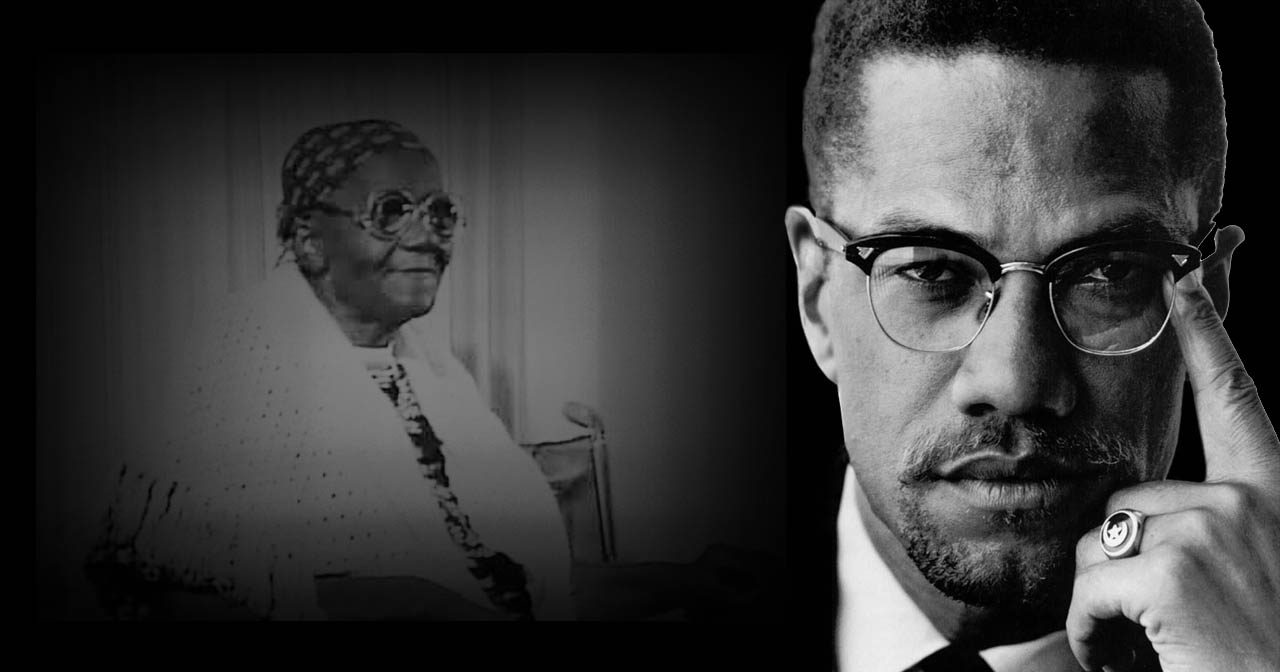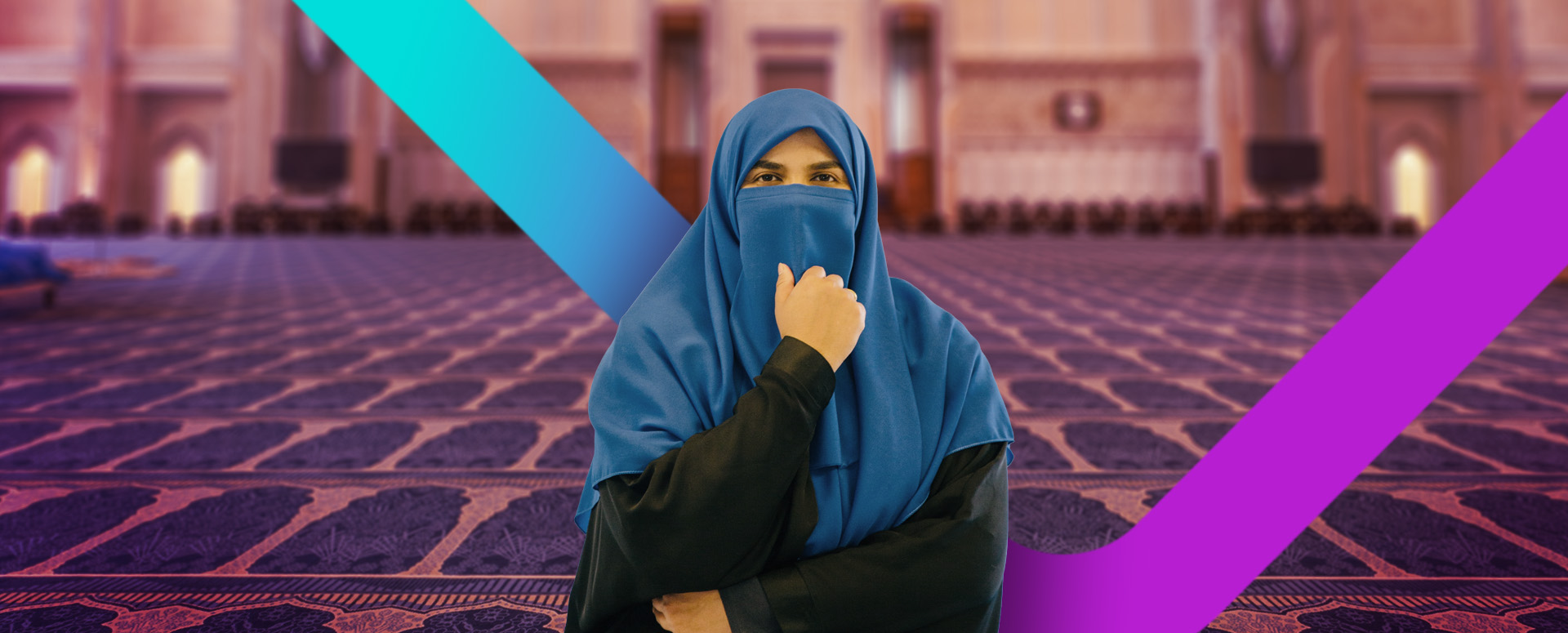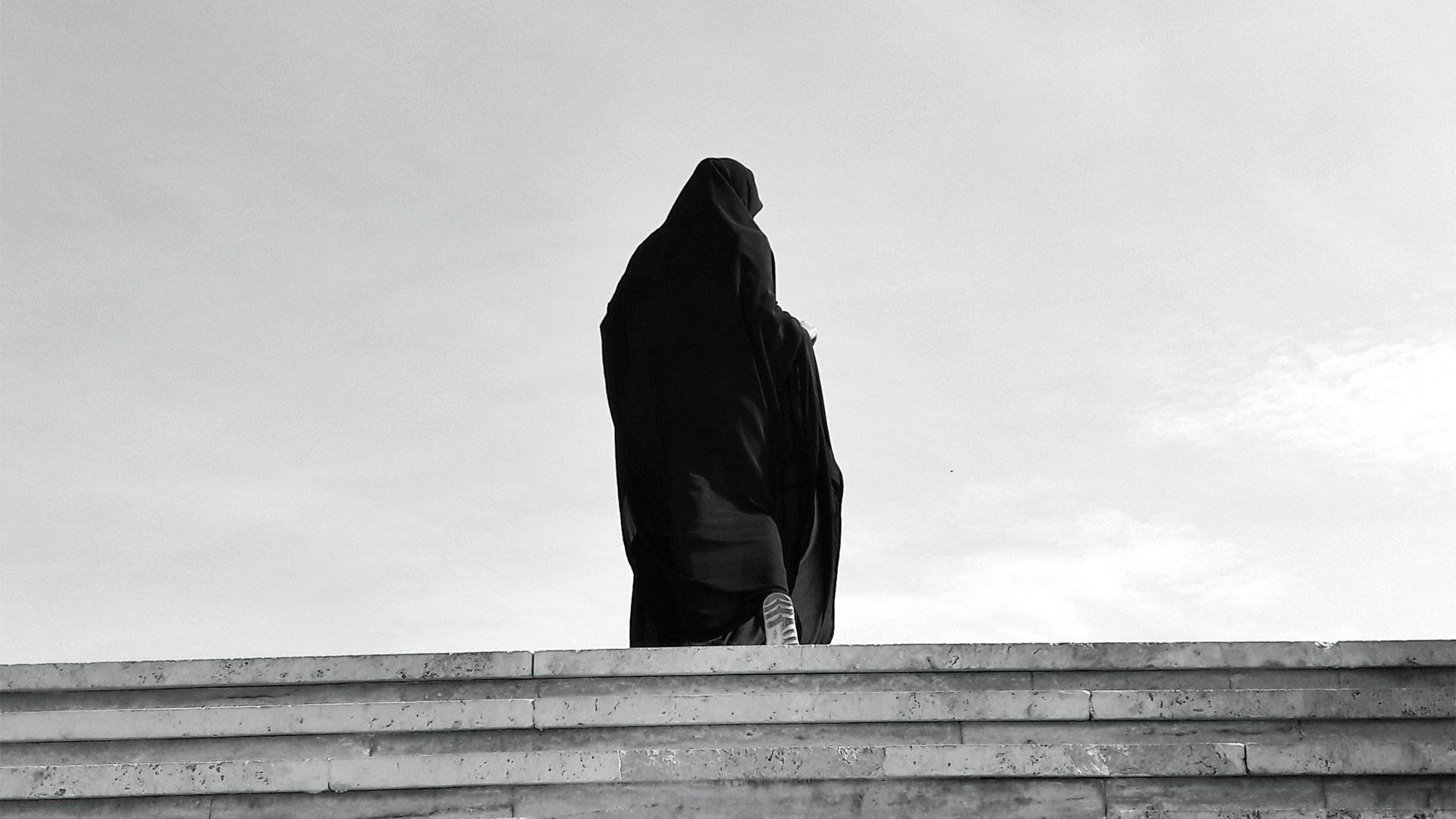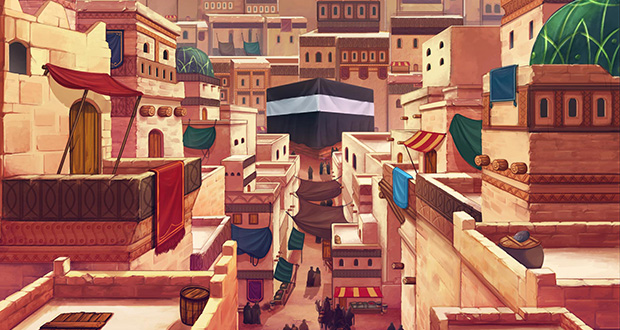
Ella Collins – The Woman Who Led Malcolm X
12 min. read
Written by:
Fatima Barkatulla
Date:
18th October 2020
She had played a very significant role in my life. No other woman ever was strong enough to point me in directions; I pointed women in directions…and now she was financing me to Mecca.
Malcolm X
I first pored over The Autobiography of Malcolm X[1] in the early 90s, as a wide-eyed hijabi teenager in a suburban London girls’ school. With hardly any visible Muslims in sight, I was eagerly seeking confident Muslim role models from the West, and in Malcolm X – El-Hajj Malik el-Shabazz – I found just that. But there was a Muslim woman in his story who impressed and intrigued me far more than Malcolm himself. Although Malcolm expressed his utter indebtedness to this woman, who was clearly a partner in his legacy, she remains somewhat of an unsung hero in Muslim circles whenever Malcolm is discussed. This woman – Ella Collins – was Malcolm’s headstrong matriarch and the half-sister who embraced orthodox Islam even before he did.
My initial intrigue with the personality of Ella could be attributed to some camaraderie I felt with her, being an elder sister. But the more I noticed how this impressive woman’s foresight, decision making, and pivotal interventions changed the trajectory of Malcolm’s life, the more remarkable she became. It was obvious that the journeys to Islam for both Malcolm and Ella were inextricably intertwined, with Ella leading the way.
Against the backdrop of the Great Depression and Jim Crow laws,[2] Malcolm’s father, Rev. Earl Little, was murdered by white supremacists. Orphaned, destitute, and hungry, Malcolm turned to petty crime to get by. To his horror, his mother was soon committed to a mental hospital, and all eight children of the Little family were disbanded to various foster homes and relatives. Although Malcolm had immense academic potential, he was left disheartened after his White school teacher discouraged him from pursuing the career in law that Malcolm said he wanted –considering it an unrealistic aspiration for a Black boy. The future looked all but bleak for Malcolm. That is, until Ella swept into his life.
Ella Little-Collins was Malcolm’s elder sister from his father’s first wife. Ella made it her business to travel all the way from the buzzing metropolis of Boston where she lived to the smaller town of Lansing, Michigan, to see how her half-siblings were faring. Motivated by her father’s instruction to nurture Malcolm’s potential in the event of his own untimely demise, Ella was keen to take her half-brother under her wing. She would later say in interviews that since Malcolm was the seventh child of the family, the old superstitious belief was that he would be supernaturally gifted.[3]
Meeting Ella – the self-made business woman involved in property in Boston and New York – Malcolm remarked that she was “the first really proud black woman I had ever seen” and that he “had never been so impressed with anybody.”[4]
Ella wasn’t just black, but like our father, she was jet black. The way she sat, moved, talked, did everything, bespoke somebody who did and got exactly what she wanted. This was the woman my father had boasted of so often for having brought so many of their family out of Georgia to Boston. She owned some property, he would say, and she was “in society.” She had come North with nothing, and she had worked and saved and had invested in property that she built up in value, and then she started sending money to Georgia for another sister, brother, cousin, niece or nephew to come north to Boston. All that I had heard was reflected in Ella’s appearance and bearing.[5]
Born in 1914, Ella Little grew up in Georgia in the South. She later moved to New York where she was secretary to the Black congressman Adam Clayton Powell. Settling in Boston, Ella managed her mother’s grocery shop and began investing in and letting property. As Malcolm himself said, Ella was “busily involved in dozens of things”, including community projects and civil rights initiatives. Fiercely opposed to welfare and poverty programmes, she was a vociferous believer in Black Americans working towards their own independence and recognising their own agency.
Ella invited the teenage Malcolm to live with her and made moves to become his legal guardian. Malcolm described this later, saying, “No physical move in my life has been more pivotal or profound in its repercussions. All praise is due to Allah that I went to Boston when I did. If I hadn’t, I’d probably be a brainwashed black Christian.”
As Malcolm got off the bus from Lansing, he was excited and eager to prove himself to his sister, reassuring her by saying, “I’ll never do anything to hurt you Ella, if I do…you tell me and I’ll get you a stick to beat me!”[6] Ella nourished him both mentally and physically, providing Malcolm with the best home cooking he ever had.
Ella’s role as Malcolm’s mother figure was cemented when she became his legal guardian from age 14 to 21, along with her husband Kenneth Jack Collins. Far from trying to suppress Malcolm’s inclination towards “aggressive” behaviour and “impulsiveness”,[7] Ella said she “stimulated” it, allowing this side of his masculinity the space for expression and hoping to discipline and channel it. As Malcolm grew older, he drifted in and out of her life and fell into the gangster lifestyle she so disapproved of. Even when in prison, she persevered in advising him through visits, letters and books, when, at last, she said that he began to face up to “facts”.[8]
Ella Embraces Islam
Although both Ella and Malcolm became members of the Black separatist group the Nation of Islam,[9] it was Ella who decided in 1959 to leave the Nation and embrace orthodox Islam.[10] She began studying with Muslim teachers in the orthodox masjid in Quincy, Massachusetts and took her shahadah there. The Nation of Islam quickly suspended her.
“I was glad there was an Islamic alternative to the Nation of Islam,” she later said in her son’s family memoir. “I also knew that it was only a matter of time before Malcolm made a similar move.”[11]
She also founded the Sarah A. Little School of Preparatory Arts in Boston, where children were taught the Qur’an, Arabic, Swahili, and other subjects.[12] She began to try to influence Malcolm in opening his heart to Islam. As Malcolm said:
I’ve said before, this is a strong big, black, Georgia-born woman. Her domineering ways had gotten her put out of the Nation of Islam’s Boston Mosque Eleven; they took her back, then she left on her own. Ella had started studying under Boston orthodox Muslims, then she founded a school where Arabic was taught! She couldn’t speak it, she hired teachers who did. That’s Ella! She deals in real estate, and she was saving up to make the pilgrimage. Nearly all night, we talked in her living room.[13]
“By the early 1960s,” Ella later told her son, “Malcolm had become convinced of the need for our Afro-Americans to have a stronger connection with orthodox Islam.” Malcolm was frustrated that the Nation’s teachings were not congruous with the Qur’an. He was also intrigued by the vast Muslim African heritage that gave Afro-Americans a connection to something transcending White supremacy, slavery, segregation and Christianity.[14]
The Pivotal Intervention
Then came perhaps the most instrumental intervention on Ella’s part. Ella offered Malcolm the money she had been saving for her own Hajj to fund what would be Malcolm’s historically critical journey to Mecca. Malcolm was disenchanted with the Nation[15] and on the path to fully embracing Islam, and Ella realised that it was pivotal for him to travel to the Muslim world and discover the Ummah and vastness of true Islam, outside of the narrow and racist ideology of the Nation.[16] When Malcolm spoke of his desire to make the pilgrimage, Ella replied, “How much do you need?”[17]
They agreed that it would be an opportunity to build key relationships with African and Muslim leaders across the Middle East and West Africa, as well as build support for the civil rights movement in the US. It was clear to Ella that she must give the money she had been saving to Malcolm.
She told me there was no question about it; it was more important that I go. I thought about Ella the whole flight back to New York. A strong woman.
Ella was intensely proud of the changes in him after his return as El-Hajj Malik el-Shabazz in 1964. He had embraced Islam at the Islamic Foundation in New York on 9th April 1964. Upon returning from his trip abroad later that year, he proudly presented to Ella his shahadah certificate from Al-Azhar University in Cairo.[18]
Ella was Malcolm’s confidante. She recalls how Malcolm returned home with two clear causes in his mind. The first was that of spreading orthodox Islam in America, for which he set up his Muslim Mosque Inc. and wrote to key Nation of Islam officials, urging them to embrace mainstream Islam. The second was his fight for human rights for all Black Americans, for which he set up the Organization for Afro-American Unity (OAAU) as a vehicle.[19]
She described it as a maturation of his outlook and saw a newfound serenity in him. “Malcolm came home a man,” she would later say, “he lost his frustrations…and his desire for material gains.” After he gave his first speech at Harvard University, Ella said that she gave him her very own diploma, saying: “Tonight, Malcolm, you are a man!” “I travelled hard, didn’t I?” he remarked to his sister. “Yes you did,” she replied, “but you made it.”[20]
Just some of the lessons that we as Muslims can glean from Ella’s life are:
1. Refuse to be a statistic. Despite the tragic circumstances of one’s family history, it is possible with the aid of Allāh and through conviction, vision, and resourcefulness, to lift oneself out of the confines of one’s conditions and thrive.
2. With greater prosperity comes greater responsibility. It is not enough to succeed. When we do so, it becomes incumbent on us to reach back and pull others up. Ella was investing in the members of her extended family, helping her local community onto its feet by funding and supporting numerous projects, including Black and ethnic studies programmes in universities all over the US.[21]
3. To nurture and invest in the potential of others can be more powerful than to be the most visible of protagonists ourselves. This requires an extraordinary level of leadership and foresight. Ella helped Malcolm whenever he was in dire straits. She opened doors for him. She sacrificed her own Hajj to fund his legendary pilgrimage and tour of the Muslim world, which proved to be pivotal in his transformation and in the transformation of the lives of the many Black Americans who followed him out of the Nation and into Islam.
4. It is important to stay connected and involved in the lives of our extended family, despite the ups and downs and rejections we might be subject to during the course of their lives. Ella’s love and exhortations were enduring when Malcolm turned to a criminal lifestyle in Boston and New York, as well as when he was in prison and when he would at times reject her goodwill. She gave him the space to learn from his own mistakes, but he knew he could turn to her no matter what.
5. Be a role model. Ella had the personality and convictions that Malcolm wished came more naturally to him. While Malcolm was ‘conking’[22] his hair and associating with White women, Ella was proud of her appearance as a dark-skinned Black woman and did not dream of hiding it. When Malcolm was becoming criminally inclined, Ella was proud of her financial independence and honest living, helping lift members of her community out of poverty.
6. When we are rooted and unapologetic about our heritage and confident in the skin that Allāh created us in, our self-assurance gives the younger generation wings. It can awaken others to the subliminal limitations they may have set upon themselves and help them discard the inferiority complex that society and the media may have caused them to internalise.
7. The Prophet (sall Allāhu ‘alayhi wa sallam) said, “Whoever guides someone to goodness will have a reward like one who did it.”[23] In the age of Insta-fame, Ella reminds us that being seen by others and being famous is not the only way to make an impact, nor is it the best way to attain reward for good deeds. Be a secret soldier of Allāh like Ella was.
Protecting Malcolm’s Legacy
Ella once likened her feelings towards Malcolm as being like those of Mary (‘alayha al-Salām) towards her son Jesus (‘alayhi al-Salām), perhaps in that she had seen him grow, helped him develop into a revolutionary, and then become targeted so viciously. She had been so fearful that he would be killed that she had even instructed her son to phone the FBI to alert them to it and had a meeting with them.[24]
It was Ella who drove from Boston to New York on the fateful day of Malcolm’s assassination to identify the body of her brother. It was Ella who paid his funeral and business expenses and ensured he had an Islamic janāzah. It was Ella who took over his Organization of Afro-American Unity, including his project of giving 35 scholarships from Al-Azhar University in Egypt and from the University of Ghana to students seeking to study abroad.[25]
What is less well known is that Ella was instrumental in preventing revenge attacks which countless people offered to carry out in the aftermath of Malcolm’s assassination. She was also very protective over Malcolm’s legacy, disparagingly calling the film portrayals and writings that emerged following his death “symbolism without substance”. She felt his deeply held Islamic beliefs and vision were being downplayed and his more mature political ideas had been erased with the removal of five chapters of the Autobiography from Alex Haley’s final manuscript.[26]
Ella would later remark that Malcolm’s murderers “took something from me that I put a lot into”.[27] Ella believed that Malcolm was “at the point where he could become stronger than ever. I could see Malcolm becoming the greatest black man in the history of the world.”[28]
Over the span of her life, Ella had married three times, and had a son named Rodnell. Ella tirelessly continued her struggle for civil rights and the teaching of Islam in America until 1988, when she suffered the amputation of both her legs from serious infection.
Malcolm’s reverence for Ella was palpable until the end. Two weeks prior to his assassination, Malcolm advised his nephew Rodnell, who described it thus: “Uncle Malcolm had called me aside one day while visiting us at home in Boston. Ma (Ella) was in the kitchen with her pots and pans and Uncle Malcolm sitting in my favourite lounge chair, and took my hand to express his concern for my future. With the press of his palm to mine, a stern look and a twinkle in his eyes he said, ‘Rodnell I want you to promise me something, you will always listen to your mother, I wish I had, if you do you’ll do alright Rodnell.’”[29]
Ella returned to her Lord on the 3rd of August 1996. In 1998, the Malcolm X – Ella Little-Collins House where Malcolm had stayed with Ella was designated a City Landmark by the Boston Landmarks Commission.[30]
Ella once said in an interview that Malcolm needed ten more years to complete the work he had started. The truth is that, half a century after his assassination, the impact of both brother and sister is still tangibly felt today. I pray that Allāh forgives our dear sister Ella and grants her manifold rewards for that Hajj she gifted to her brother. I pray that Allāh accepts her da’wah to her brother and investment into her community as a prodigious sadaqah jāriyah that enlightens her grave and continues to bring her ongoing reward. Āmīn thumma āmīn.
Intrigued?
If you found this article helpful and think others could benefit, please share it. If you’d like to know more, don’t hesitate to reach out to us.
Get in touch

